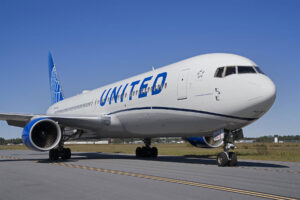Last edit by: serpens
What is EMV?
EMV is a standard for smart (or integrated-circuit, or chip) cards and the devices that can accept them. The standards are maintained by EMVCo and based on ISO 7816 (or ISO 14443 for contactless).
These cards come in two flavours: contact and contactless. Examples below:

----------------------------------------------------------
Notice the contactless
 indicator on the right-hand side (it looks like a sideways Wi-Fi symbol). It may also be found on the back of the card (for example, on the back of the new Costco credit card).
indicator on the right-hand side (it looks like a sideways Wi-Fi symbol). It may also be found on the back of the card (for example, on the back of the new Costco credit card).Where can I get a chip card?
Hawaiian717 operates a website with crowd-sourced information about various cards. You can adjust the search parameters to see cards with contactless, have PIN-primary authentication, etc.
Which businesses accept chip cards?
tmiw operates a website, also primarily crowd-sourced, that tracks chip-enabled merchants on a map. You can see if a merchant supports PIN, contactless, Quick Chip, et al.
Why doesn't my chip card ask for a PIN?
This is likely because you have a signature-preferring card. At this time, PIN-preferring cards issued in the US are rare. Not many financial institutions offer them; most of them instead provide Chip-and-Signature cards, which are programmed to prefer signature over PIN, if the card supports PIN at all.
What is the difference between Chip-and-Signature and Chip-and-PIN?
To the cardholder, the only major difference is how they authenticate themselves at the point of sale. The cardholder inserts their card as normal; instead of signing a screen or receipt, they will be asked to enter their PIN on the keypad.
[spoiler]
A few financial institutions issue some form of Chip-and-PIN credit cards or prepaid cards. Prepaid EMV cards however are not recommended due to junk fees.
Why no PIN? (cont.)
American debit cards are unique because they are psuedo-PIN-preferring cards. which may work at many automated kiosks. However, bear in mind the word may is used above is a context where there is no absolute certainty of success for certain environments such as automated kiosks due to different natures of offline and online transactions.
What is the difference between Chip-and-Signature and Chip-and-PIN? (cont.)
Most cards issued in the US are programmed to prefer signature, so save very few instances, they will prompt for a signature (unless the merchant sets a signature waiver). A PIN may be necessary in countries with mostly PIN-preferring cards when using unattended terminals (such as pay-at-the-pump or mass transit). If the card has a PIN for backup verification or ATMs, then that PIN should work. Otherwise, the card will be rejected. If the card is rejected, then either a.) the transaction must be performed by an attendant or b.) an alternative payment method will be required.
Some credit union issued credit cards will have this CVM (Cardholder Verification Method) as secondary if Chip-and-Signature cannot be done. Chip-and-PIN is the more prevalent method of authentication used outside the US, especially in transaction environments where no human interaction is needed (i.e. automated gas pumps, toll roads, train kiosks, etc.).
One chip can hold a lot more data, therefore it is capable of doing multiple verification methods. That's one of the great things about EMV over the mag-stripe which can hold very little data.
I want to know for sure what my EMV chip does. Is there anyway I can test out my own EMV card to see what the CVM list is?
alexmt has written up a nice step-by-step procedure on Post #3615.
If most of the EMV cards in the US is the Chip-and-Signature type, doesn't that mean it's still useless abroad?
Depends if you see it as glass half empty or glass half full. See Post #3 for further details on how Chip-and-Signature has worked both successfully and unsuccessfully depending on the merchant transaction environment and use your best judgment whether which one is right for you.
I don't want a chip in my card. I heard horror stories all over the media saying hackers can steal my credit card info from a mile away.
There are two types of chips. One is contactless and the other is contact. Cards can be either one or the other, or both.
In the Google Docs spreadsheet, the cards that are capable of contactless payments are listed seperately under the "RFID or NFC contactless chip" column. If it says yes, then that means it has the ability to do contactless payments. If it says no, it doesn't have that feature.
The one that the media has overhyped about hackers "stealing your information wirelessly" was the contactless type like this:
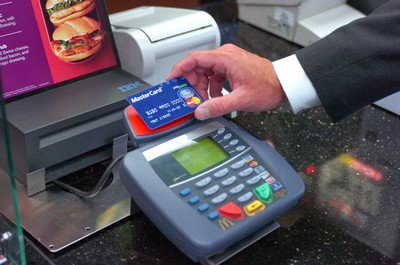
You are worried about this happening, right?
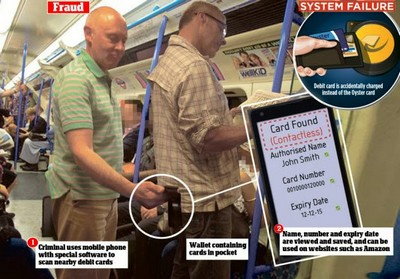
You don't have to worry. EMV is a chip standard that can have both contact and contactless interfaces. With the traditional contact interface, this means you actually have to physically insert the chip into a POS terminal for it to be authorized, like this:
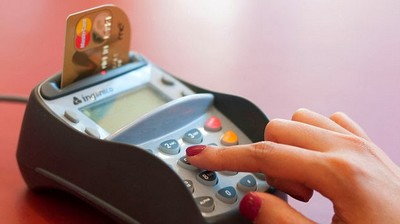
With the contact interface, nothing is wireless. No data is sent out in a stand-alone contact type EMV chip. With the EMV contactless interface, data is sent wirelessly.
Furthermore, contactless chip cards are required to show a symbol (looks like Wi-Fi symbol) somewhere on the card that to denote its capability as a contactless card. For example, here's an example of a Discover Card with contactless capability (in which Discover calls "Discover ZIP") showing the contactless symbol on the back of the card:
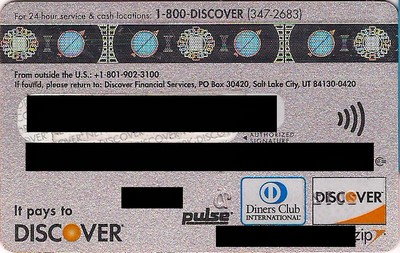
Don't believe everything that the media says. Besides, millions of people all over the world from London to Singapore, uses contactless payments daily in extremely crowded subways and mass transit with nary any problems. There are multiple layers of encrypted securities and keys that are needed to break the code.
Frankly, giving your physical card to a waiter/waitress who takes the card out of your view is much more susceptible to fraud than contactless payments.
Why should I care?
If you are an international traveler, you will want this because majority of the world has or in the process of converting to this payment format.
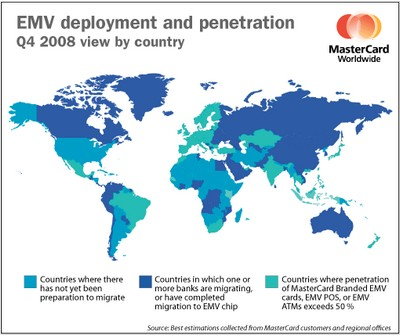
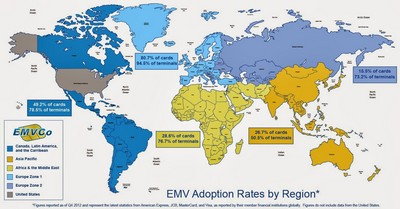
In fact, in 2012, even North Korea moved to the EMV format, leaving the US as one of the countries in the world that hasn't done so.
In addition, VISA, MC, AMEX, and Discover have all agreed to incentivize the USA shifting to EMV payments by 2015 by shifting liability for fraudulent transactions to merchants if they do not have EMV equipment and the cardholder has an EMV card. So if you travel internationally or would like to get one before the others, you might be interested in getting one.
BS! I had no problems using my card in [insert whereever country], [insert whatever point in time]
If you stick to the tourist path where they have lots of visitors from the US, you should have no problems using your mag-stripe only card in hotels and restaurants, at least for now. But as things can change as things go forward.
However, consider that once you start taking the off-beaten path, go to non-touristy places where they are not familiar with mag-stripes, rent a car and use toll roads, fill up gas, or try to buy train tickets you might end up into a trouble of the machine not recognizing your card because it lacks the chip. Furthermore, a lot of toll roads, gas pumps, and automated ticket machines lack any human assistance to help you when you need it the most.
But [insert credit card company] told me all merchants that display their logo must accept them! All I have to do is report them for violating their agreements, right?
There are several factors against this.
1. You can only speak English. The merchant representative, most likely a part-time clerk earning minimum wage, speaks in a different language, let's say French. If you have no French language skills, how are you going to get your point across? Are you going to whip out your cell phone at exorbitant int'l roaming charges and hope the customer service is going to translate it for you on the spot? Or maybe you might actually know French. But how about Swahili, Farsi, Balinese, or the multiple languages in mainland China?
2. Just like US, the rest of the world's businesses uses part-time minimum wage workers as cashiers to cut down on labor costs. Most of their SOP training manuals are written by MBA types to not to do anything they are not familiar with. Do not expect them to understand the intricate details of credit card mumbo jumbo. You don't expect Taco Bell employees to understand the minute details of Discover-JCB-Union Pay agreements, right? Same thing the other way around: be respectful as a guest in their country, prepare in advance in their ways, avoid being an "ugly American" stereotype.
3. You are a guest in their country. You are a minority. If 99.9% of their country's people and other tourists from around the world uses EMV, do you really think they are going to accomodate the 0.1% of American tourists who only have mag-stripes credit cards?
4. Again, you are a guest in their country. How would you, as an American standing in line, react if a Chinese tourist was clogging up the lines at a local Taco Bell because the clerk doesn't understand the Discover-Union Pay agreement and has trouble communicating between Mandarin spoken by the tourist and English spoken by the Taco Bell clerk? Same way the other way around. You do not want to clog up the lines for everyone. The less hassle, the better.
5. VISA and MC make tons of money from merchants in that country. Say SNCF French Rail. It's a billion dollar company in France. Do you think VISA is going to pull the plug of their relationship with SNCF because SNCF refuses to do mag-stripe processing at their unmanned train station kiosk? Of course not. Be realistic.
6. And lastly, if you're up against an unstaffed toll kiosk, gas pump or train ticket machine, are you going to yell curses at the machine?
But I want my credit card to be able to be used in the US too!
No worries. They have not gotten rid of the mag-stripe on the back of the card for backward compatibility reasons, just like we still have embossed numbers on our cards for backwards compatibility to using those old carbon copy imprinters.
[insert own Hyatt card image front and back together with red arrows pointing to all the backward compatibility features]
You use the chip on the front of the card abroad (for now), and the mag-stripe just like any other card for the US. Basically, you're increasing your credit card's acceptance rate by getting a card that both via the chip and the mag-stripe. You're getting a better deal for free.
And when 2015 comes along and US switches to EMV, you'll be way ahead of everyone else too!
So why did the rest of the world and the US moved/moving toward EMV?
Primarily, due to fraud concerns. You see, the mag-stripe has been with us since the 1950s. It may have been the most high tech thing back in the day, but with the technology that is available today, any shmo can pick up a $100 USB magnetic card skimming device off of eBay and get your credit card info.
And unlike skimming off contactless cards which actually need the person to have l33t programming skills, skimming off a magnetic stripe has become so ubiquitous that nary a day goes about skimming fraud going on somewhere in America, from gas pumps, Michael's stores (2011), Target breaches (2013), restaurant waiters/waitresses, to even McDonald's drive thrus.
https://www.google.com/search?q=skimming+fraud
These type of fraud used to be prevalent in Europe. But once they started switching over to EMV starting over 2 decades ago, this type of fraud went elsewhere. It went over to Asia, Canada and Mexico, Latin America, etc. etc. until they too began implementing EMV to combat skimming fraud. The US is practically the only country left that hasn't done so, therefore all the fraud that used to take place elsewhere is now happening here.
But EMV is old and it's not fool proof. Shouldn't we just skip over it and do something new instead?
Yes, EMV is old. It was developed in the 1990s, and its smart card payment predecessor was first introduced in France. But as of today, it has become the de-facto global standard of payments.
But then, what else is there? There is no other de facto global standard of payments alternative. For example, if we decide to skip over it and do something new, hypothetically like DNA matching technology, it still means US int'l travelers will continue to have problems abroad with useless plastic acceptance because no other country is using this DNA matching technology except the US.
Besides, nothing is fool proof. You can say that the bank vault isn't fool proof because you can crack it open if enough C4 is used. But your average low-life scumbag isn't likely to get military grade C4 easily either. But the bank vault does make it harder to get the bank's money over say a petty cash box. That's the point here. EMV is akin to a security tight bank vault, the old mag-stripe is akin to a petty cash box lying around inside the drawer.
I'm a business owner and I don't think EMV is going to take off. I'm not going to spend extra hundreds of dollars to upgrade my credit card machine. Convince me other wise why I should.
I can understand the added extra cost to your business once this switchover takes place. But before even saying that, look at your existing POS terminal. Does it have a slot somewhere to insert a card?
Most likely, if you had replaced your POS terminal within the past five years, you already have an EMV capable terminal. EMV is basically just not turned on yet from the processor and acquirer side.
If you have an EMV capable terminal, then a best bet would be to contact your acquirer to have the EMV feature turned on. You did your end of the deal already by having an EMV capable terminal, it is now the acquirers' responsibility to turn it on in accordance to the EMV switchover mandate.
And if you don't, you are going to replace your POS terminal anyway from common wear and tear. It isn't a hard switch-over. You can continue to use your POS terminal until it dies out because EMV cardholders will still have the mag-stripe on the back. And by the time your non-EMV capable POS terminal is up for replacement the market will be full with these newer POS terminals that can accept the mag-stripe, EMV, as well as contactless payments.
In addition, you may also want to check with your acquirer or processor about EMV capable terminals. Some of them are willing to replace your terminal for free in preparation for the US EMV switchover. Call and ask for details.
But what's in it for me? I'm the one that has to pay for the upgrade.
All the major card networks have given incentives for merchants for the upcoming EMV switchover.
If 75% or more of your credit card transactions are done on an EMV contact and contactless terminal, they are going to waive your annual PCI-DSS fees, which usually costs you around $5.00-$19.95/month per terminal. The overall long term cost savings of those compliance fees will be larger than the cost of an one time upgrade for the terminal.
The downside is that once EMV switchover happens and if you do not have a POS terminal that is able to accept EMV, the fraud liability shifts over to the merchant.
USA EMV cards: Availability, Q&A (Chip & PIN or Signature) [2017>]
#631
Join Date: Jul 2007
Posts: 1,762
Keep in mind that FT has non-Americans too, some (most?) of whom have PIN preferring cards. In my experience, a thread like this is still pretty important to have so that they can be prepared when, say, a server at a US restaurant gets an "unexpected" PIN prompt on their non-wireless terminal. Or when the takeout assumes that your card is a debit card and tries to do PIN bypass so it can be run "as credit". 
Maybe it'd be different if PIN wasn't allowed to be supported on American terminals at all. But that'd require foresight and a willingness to enforce standards.

Maybe it'd be different if PIN wasn't allowed to be supported on American terminals at all. But that'd require foresight and a willingness to enforce standards.
#632
FlyerTalk Evangelist
Join Date: Jan 2014
Location: San Diego, CA
Programs: GE, Marriott Platinum
Posts: 15,508
In all due respect to you (there's that overused phrase again I suppose), I think that's an overreach. I don't think most non Yanks care; if the card works, that's fine. Just what was the genesis of these threads? Look at the title of the threads...USA emv cards availability now. Not merchant acceptance. Will my card work? Period. How the merchant chooses to handle it is their business and frankly I couldn't care less (other than being inconvenienced for a few seconds more). I still think signature bypass we have in this country for small purchases is the way to go.
I will give you that things will likely work at least most of the time though--if you go to places that have always had customer-facing equipment (or had the foresight to disable PIN support if they didn't install such during their move to EMV).
#633
Join Date: Nov 2012
Posts: 3,537
JEFFJAGUAR, if you no longer find the topic interesting and useful, why do you still participate?
#634
Join Date: Jul 2007
Posts: 1,762
And again, I'm not saying this to be obnoxious or rude to anybody. I simply don't get its importance but if it's important to others, well that's the way the cookie crumbles I suppose. Please forgive me.
#635
Join Date: Mar 2017
Programs: HHonors, TrueBlue, Delta SkyMiles, Hyatt Discoverist, Starwood Preferred Guest, American Airlines.
Posts: 2,035
The original post of this thread doesn't make it seem like a thread that's supposed to solely be on the subject of where chip and signature cards are accepted overseas.
It seems more like a thread educating Americans about chip cards in general. Americans have every right to complain about signature priority cards... It should be as easy as possible to use a card overseas and not have to worry if your card will work because it doesn't like using PIN authorization.
People don't understand why America looks like the laughing stock of the civilized world today... It's because of many reasons, including cards that are behind the rest of the world in technology. We don't always need to be "different" than everyone else, especially when it's a less modern version of what everyone else has.
It seems more like a thread educating Americans about chip cards in general. Americans have every right to complain about signature priority cards... It should be as easy as possible to use a card overseas and not have to worry if your card will work because it doesn't like using PIN authorization.
People don't understand why America looks like the laughing stock of the civilized world today... It's because of many reasons, including cards that are behind the rest of the world in technology. We don't always need to be "different" than everyone else, especially when it's a less modern version of what everyone else has.
#636
FlyerTalk Evangelist
Join Date: Jan 2014
Location: San Diego, CA
Programs: GE, Marriott Platinum
Posts: 15,508
Again, if there was any foresight with the US migration to EMV, contactless would have been included with all no-FTF cards at minimum and would include ODA so that they'd work on TfL and other similar transit agencies. Visa might consider stuff like PIN and ODA "legacy" and "deprecated" in the US but that doesn't mean there's not new stuff being implemented elsewhere that needs such features.
People don't understand why America looks like the laughing stock of the civilized world today... It's because of many reasons, including cards that are behind the rest of the world in technology. We don't always need to be "different" than everyone else, especially when it's a less modern version of what everyone else has.
Also something to consider: people in other chip and signature countries seem to be perfectly fine with that choice, whether it's because of ease of use or because of cardholder liability laws being far different (and possibly less pro-consumer) than in the US.
#637
Join Date: Jul 2007
Posts: 1,762
The original post of this thread doesn't make it seem like a thread that's supposed to solely be on the subject of where chip and signature cards are accepted overseas.
It seems more like a thread educating Americans about chip cards in general. Americans have every right to complain about signature priority cards... It should be as easy as possible to use a card overseas and not have to worry if your card will work because it doesn't like using PIN authorization.
People don't understand why America looks like the laughing stock of the civilized world today... It's because of many reasons, including cards that are behind the rest of the world in technology. We don't always need to be "different" than everyone else, especially when it's a less modern version of what everyone else has.
It seems more like a thread educating Americans about chip cards in general. Americans have every right to complain about signature priority cards... It should be as easy as possible to use a card overseas and not have to worry if your card will work because it doesn't like using PIN authorization.
People don't understand why America looks like the laughing stock of the civilized world today... It's because of many reasons, including cards that are behind the rest of the world in technology. We don't always need to be "different" than everyone else, especially when it's a less modern version of what everyone else has.
This is the successor thread to 2 others which date back to a time when there was a growing problem of USA issued cards not being honored at some places outside the USA because they lacked the chip. I've been posting here back to the original thread and was among the most vocal about what I considered at the time the silly decision to forego chip and pin in favor of chip and signature. But I don't see the banks moving off their insistence that in their business model, chip and signature is really the same as chip and pin except in case the physical card is actually lost or stolen. And they have statistics to show, so they claim, that such occurrences are somewhat less costly to them than setting up a pin preferred environment. USAA acknowledged that when after the first euphoria of issung a pin preferred card, they suddently changed their mind and went to signature preferred. Was it because they worried that people would not use their card if they had a card easier to use lacking the necessity of memorizing a pin?
Again, I'm not trying to be rude to anybody who has a different opinion and
it's worth discussing here without rancor. I certainly would have preferred chip and pin but am resigned that it is not going to happen. And to the best of my knowledge, there are still some countries which do not use pins. I believe, correct me if I'm wrong, Singapore falls into that category.
The key and most important issue remains zero liability for fraud. And I remember what some Canadian said a few years ago. There was a story in nj.com where somebody had their mailbox raided and using the information, some vermin were able to contact his bank and get new pins and an address change. When the person found out and complained, at first Chase said sorry about the transactions were completed with pins. They did later relent after pressure from the newspaper's consumer reporter but perhaps in a certain sense, signature preferred cards are safer for us as consumers. Just suggesting.
Last edited by JEFFJAGUAR; Mar 13, 2017 at 12:30 pm
#638
FlyerTalk Evangelist
Join Date: Jan 2014
Location: San Diego, CA
Programs: GE, Marriott Platinum
Posts: 15,508
USAA acknowledged that when after the first euphoria of issung a pin preferred card, they suddently changed their mind and went to signature preferred. Was it because they worried that people would not use their card if they had a card easier to use lacking the necessity of memorizing a pin?
#639
Join Date: Mar 2017
Programs: HHonors, TrueBlue, Delta SkyMiles, Hyatt Discoverist, Starwood Preferred Guest, American Airlines.
Posts: 2,035
Or their customers (some of whom aren't deployed overseas) complained that some smaller stores weren't accepting their cards precisely due to terminals not being customer accessible, much like what I've described. Easier to just adopt what everyone else is doing in that case, especially if you don't have enough clout to punish merchants for such rejections. And as we've seen with other cards, an issuer can easily allow customers to opt-in to PIN preference if they desire.
I understand you think the merchant has more power than the card networks, and that owners may just drop the card networks if the owner doesn't like their demands, but it isn't that simple... If getting rid of credit card acceptance was so simple, Walmart would've done it years ago. Quite frankly, not accepting credit cards would cut down on 75% of the customers that go to that business, so companies like Walmart will do whatever the networks tell them to, including signature transactions with debit cards, which is also something a bunch of merchants hate, but they still take cards.
Additionally it's not even about telling the merchants what to do, it's about their interchange fee... A PIN would result in a lower interchange fee.
If my ramble wasn't articulate enough, the point is merchants will take cards no matter how many standards the networks put out there, because the companies don't want to lose a significant percentage of their business. And if you tell them they need to accept PIN for credit + debit, they'll do it or else face liability for fraudulent charges. Do you think rental car companies and hotels will begin to take cash? Nope. They'll comply with chip + pin plus a consumer facing terminal rather than get rid of card acceptance.
The networks have the power, not the merchant.
#640
FlyerTalk Evangelist
Join Date: Jan 2014
Location: San Diego, CA
Programs: GE, Marriott Platinum
Posts: 15,508
I understand you think the merchant has more power than the card networks, and that owners may just drop the card networks if the owner doesn't like their demands, but it isn't that simple... If getting rid of credit card acceptance was so simple, Walmart would've done it years ago. Quite frankly, not accepting credit cards would cut down on 75% of the customers that go to that business, so companies like Walmart will do whatever the networks tell them to, including signature transactions with debit cards, which is also something a bunch of merchants hate, but they still take cards.
And if you tell them they need to accept PIN for credit + debit, they'll do it or else face liability for fraudulent charges. Do you think rental car companies and hotels will begin to take cash? Nope. They'll comply with chip + pin plus a consumer facing terminal rather than get rid of card acceptance.
The networks have the power, not the merchant.
The networks have the power, not the merchant.
That small bakery down the street? Cash is probably less expensive for them thanks to the much smaller dollar amounts involved. For example, BofA charges $0.30 per $100 deposited after the first $7500 or $20,000 deposited in a month (depending on the type of account); even the least expensive merchant account is significantly more expensive per transaction. The calculus changes, of course, if said bakery brings in enough cash to need armored transport or if the bakery is in an area that has low cash use in general.
In short, it's likely more consumer demand that's keeping smaller places accepting cards than anything.
#641
Join Date: Mar 2017
Programs: HHonors, TrueBlue, Delta SkyMiles, Hyatt Discoverist, Starwood Preferred Guest, American Airlines.
Posts: 2,035
Bingo, consumer demand drives it.
Quite frankly the merchants who whine about taking cards can suck it up. It's not all about them, which seems to be the trend in this day and age. They raise their prices to accommodate the fees, so there's nothing to whine about.
Yes, Walmart temporarily dropped Visa acceptance in Canada for a short period of time, but there's still AMEX and MasterCard (I doubt they accept Discover). Either way they didn't stop accepting cards all together, so that doesn't count lol.
Some states also have laws that prohibit surcharging for a credit card. I know New York State does it. We've seen how abusive merchants get when they're allowed to surcharge... I've heard merchants don't actually follow the rules, but surcharge whatever they want. My biggest beef is when a store only accepts "credit network" payments, so even when you want to use your debit card which should NEVER have a surcharge, you're forced to pay a credit card surcharge anyways.
Putting a minimum amount drives me crazy, but it really depends on the merchant. $7 minimum at my barber? That's fine (the haircut used to be $5, and then I'd put a $2 tip on it). But this place at the mall which sells snacks and drinks has a $5 minimum, even with a debit card (because he only runs as credit), and the place is a ghost town... Nobody wants to be forced to spend $5 on snacks and drinks just to use a card... I've walked out of that place before, and this was way before I was even into credit cards.
Quite frankly the merchants who whine about taking cards can suck it up. It's not all about them, which seems to be the trend in this day and age. They raise their prices to accommodate the fees, so there's nothing to whine about.
Yes, Walmart temporarily dropped Visa acceptance in Canada for a short period of time, but there's still AMEX and MasterCard (I doubt they accept Discover). Either way they didn't stop accepting cards all together, so that doesn't count lol.
Some states also have laws that prohibit surcharging for a credit card. I know New York State does it. We've seen how abusive merchants get when they're allowed to surcharge... I've heard merchants don't actually follow the rules, but surcharge whatever they want. My biggest beef is when a store only accepts "credit network" payments, so even when you want to use your debit card which should NEVER have a surcharge, you're forced to pay a credit card surcharge anyways.
Putting a minimum amount drives me crazy, but it really depends on the merchant. $7 minimum at my barber? That's fine (the haircut used to be $5, and then I'd put a $2 tip on it). But this place at the mall which sells snacks and drinks has a $5 minimum, even with a debit card (because he only runs as credit), and the place is a ghost town... Nobody wants to be forced to spend $5 on snacks and drinks just to use a card... I've walked out of that place before, and this was way before I was even into credit cards.
#642
Join Date: Jul 2007
Posts: 1,762
Bingo, consumer demand drives it.
Quite frankly the merchants who whine about taking cards can suck it up. It's not all about them, which seems to be the trend in this day and age. They raise their prices to accommodate the fees, so there's nothing to whine about.
Yes, Walmart temporarily dropped Visa acceptance in Canada for a short period of time, but there's still AMEX and MasterCard (I doubt they accept Discover). Either way they didn't stop accepting cards all together, so that doesn't count lol.
Some states also have laws that prohibit surcharging for a credit card. I know New York State does it. We've seen how abusive merchants get when they're allowed to surcharge... I've heard merchants don't actually follow the rules, but surcharge whatever they want. My biggest beef is when a store only accepts "credit network" payments, so even when you want to use your debit card which should NEVER have a surcharge, you're forced to pay a credit card surcharge anyways.
Putting a minimum amount drives me crazy, but it really depends on the merchant. $7 minimum at my barber? That's fine (the haircut used to be $5, and then I'd put a $2 tip on it). But this place at the mall which sells snacks and drinks has a $5 minimum, even with a debit card (because he only runs as credit), and the place is a ghost town... Nobody wants to be forced to spend $5 on snacks and drinks just to use a card... I've walked out of that place before, and this was way before I was even into credit cards.
Quite frankly the merchants who whine about taking cards can suck it up. It's not all about them, which seems to be the trend in this day and age. They raise their prices to accommodate the fees, so there's nothing to whine about.
Yes, Walmart temporarily dropped Visa acceptance in Canada for a short period of time, but there's still AMEX and MasterCard (I doubt they accept Discover). Either way they didn't stop accepting cards all together, so that doesn't count lol.
Some states also have laws that prohibit surcharging for a credit card. I know New York State does it. We've seen how abusive merchants get when they're allowed to surcharge... I've heard merchants don't actually follow the rules, but surcharge whatever they want. My biggest beef is when a store only accepts "credit network" payments, so even when you want to use your debit card which should NEVER have a surcharge, you're forced to pay a credit card surcharge anyways.
Putting a minimum amount drives me crazy, but it really depends on the merchant. $7 minimum at my barber? That's fine (the haircut used to be $5, and then I'd put a $2 tip on it). But this place at the mall which sells snacks and drinks has a $5 minimum, even with a debit card (because he only runs as credit), and the place is a ghost town... Nobody wants to be forced to spend $5 on snacks and drinks just to use a card... I've walked out of that place before, and this was way before I was even into credit cards.
As far as surcharges, we still have the semantics argument. When does a surcharge become a cash discount? That case is still in the courts and really we have not reached a firm conclusion. Certainly gasoline stations get away with callng their surcharges cash discounts. I defy somebody to explain to me the difference. If I pay more to use my credit card at a gasoline pump, I am being surcharged, aren't I?
Minimums? Thank the Durbin bill for that. MC and visa had written into their merchant agreements a prohibition on setting minimums but the practice was prohibited in the Durbin legislation at least the networks were prohibited from prohibiting minimums for amounts under $10. We can argue that too. Certainly a minimum is much more likely to occur in a mom and pop shop than a large chain but then again their interchange fees are quite a bit higher.
Lots of things we can do of course when it comes to money. We should emulate the Canadians and do away with the penny and the $1 and $2 paper bills but neither is going to happen here soon. My question is for our Canadian friends here. If I go to Mickey D's in Canada and the bill comes to C$5.73, is the credit card written up at C$5.73 or rounded to $5.75? I can't wait for the cashless society myself.
#643
Join Date: Mar 2017
Programs: HHonors, TrueBlue, Delta SkyMiles, Hyatt Discoverist, Starwood Preferred Guest, American Airlines.
Posts: 2,035
You would love Sweden. Cash is hardly ever used there anymore. Denmark also has gone a long way, not as far as Sweden, in heading for the cashless society.
As far as surcharges, we still have the semantics argument. When does a surcharge become a cash discount? That case is still in the courts and really we have not reached a firm conclusion. Certainly gasoline stations get away with callng their surcharges cash discounts. I defy somebody to explain to me the difference. If I pay more to use my credit card at a gasoline pump, I am being surcharged, aren't I.
Minimums? Thank the Durbin bill for that. MC and visa had written into their merchant agreements a prohibition on setting minimums but the practice was prohibited in the Durbin legislation at least the networks were prohibited from prohibiting minimums for amounts under $10. We can argue that too. Certainly a minimum is much more likely to occur in a mom and pop shop than a large chain but then again their interchange fees are quite a bit higher.
Lots of things we can do of course when it comes to money. We should emulate the Canadians and do away with the penny and the $1 and $2 paper bills but neither is going to happen here soon. My question is for our Canadian friends here. If I go to Mickey D's in Canada and the bill comes to C$5.73, is the credit card written up at C$5.73 or rounded to $5.75? I can't wait for the cashless society myself.
As far as surcharges, we still have the semantics argument. When does a surcharge become a cash discount? That case is still in the courts and really we have not reached a firm conclusion. Certainly gasoline stations get away with callng their surcharges cash discounts. I defy somebody to explain to me the difference. If I pay more to use my credit card at a gasoline pump, I am being surcharged, aren't I.
Minimums? Thank the Durbin bill for that. MC and visa had written into their merchant agreements a prohibition on setting minimums but the practice was prohibited in the Durbin legislation at least the networks were prohibited from prohibiting minimums for amounts under $10. We can argue that too. Certainly a minimum is much more likely to occur in a mom and pop shop than a large chain but then again their interchange fees are quite a bit higher.
Lots of things we can do of course when it comes to money. We should emulate the Canadians and do away with the penny and the $1 and $2 paper bills but neither is going to happen here soon. My question is for our Canadian friends here. If I go to Mickey D's in Canada and the bill comes to C$5.73, is the credit card written up at C$5.73 or rounded to $5.75? I can't wait for the cashless society myself.
Cash discount is just that, a cash discount. I can see why many people get confused over this. The store sets a price, let's say $4.85. Now, the person who's paying with Cash gets to pay $4.45, but the person with a card has to pay $4.85. The cost of the item needs to be displayed as $4.85. With credit card surcharging, the cost would suddenly go up to a price that isn't listed, probably over $5.
I thought Durbin only applied to debit card regulations, not credit.
#644
FlyerTalk Evangelist
Join Date: Jan 2014
Location: San Diego, CA
Programs: GE, Marriott Platinum
Posts: 15,508
Some states also have laws that prohibit surcharging for a credit card. I know New York State does it. We've seen how abusive merchants get when they're allowed to surcharge... I've heard merchants don't actually follow the rules, but surcharge whatever they want. My biggest beef is when a store only accepts "credit network" payments, so even when you want to use your debit card which should NEVER have a surcharge, you're forced to pay a credit card surcharge anyways.
As far as surcharges, we still have the semantics argument. When does a surcharge become a cash discount? That case is still in the courts and really we have not reached a firm conclusion. Certainly gasoline stations get away with callng their surcharges cash discounts. I defy somebody to explain to me the difference. If I pay more to use my credit card at a gasoline pump, I am being surcharged, aren't I?
Lots of things we can do of course when it comes to money. We should emulate the Canadians and do away with the penny and the $1 and $2 paper bills but neither is going to happen here soon. My question is for our Canadian friends here. If I go to Mickey D's in Canada and the bill comes to C$5.73, is the credit card written up at C$5.73 or rounded to $5.75? I can't wait for the cashless society myself.
It took about a decade for the US to start rolling out the chip after Europe did, so I expect contactless to appear on cards en masse around 2025 or so. Or maybe Visa will deprecate those for the US market like they did with PIN and ODA and just tell people to pay with their phones.
Most of it does. The minimums bit is for credit cards, though.
#645
Join Date: Mar 2017
Programs: HHonors, TrueBlue, Delta SkyMiles, Hyatt Discoverist, Starwood Preferred Guest, American Airlines.
Posts: 2,035
In all due respect to you (there's that overused phrase again I suppose), I think that's an overreach. I don't think most non Yanks care; if the card works, that's fine. Just what was the genesis of these threads? Look at the title of the threads...USA emv cards availability now. Not merchant acceptance. Will my card work? Period. How the merchant chooses to handle it is their business and frankly I couldn't care less (other than being inconvenienced for a few seconds more). I still think signature bypass we have in this country for small purchases is the way to go.
AMEX doesn't have the kind of leverage at small businesses that Visa/MC do because they charge higher fees and don't have nearly as many card holders.
Edit: Sorry Jeff, didn't mean to quote you.
Last edited by mikesyr18; Mar 13, 2017 at 7:57 pm
